Venezuela’s Dispossessed
Half of Venezuela’s Jewish community fled under Hugo Chávez, who died in 2012. Will the other half follow?
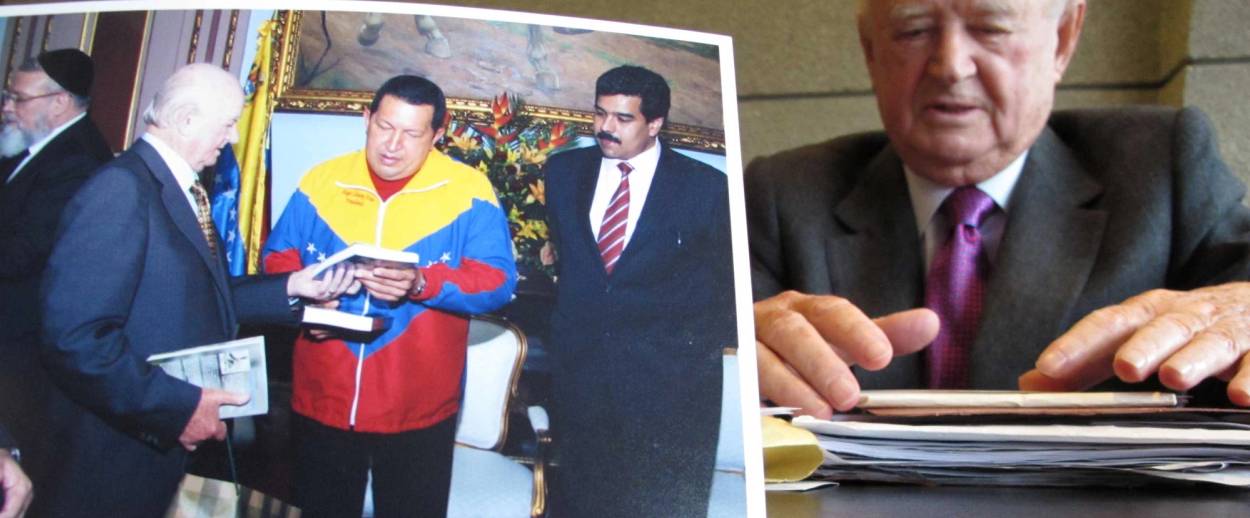



During a recent trip to Bogotá, Colombia, where I’d lived for years, I discovered that the wealthier parts of the city were filling up with an odd sort of super-refugee. The new arrivals were mainly rich Venezuelans fleeing an increasingly chaotic situation in their home country: oil execs booted out by nationalization, industrialists frustrated by the corrupt and now hostile business environment, successful entrepreneurs and others displaced by a newly minted Russian-style oligarchy loyal to Venezuela’s president, Hugo Chávez. These transplants, many of them Jews, were arriving in the Colombian capital and prospering because they had tremendous skills and valuable international connections—and because they were coming with their social and business ties intact. Their first complaint was invariably about what they called “the security situation” in Caracas. That they found Bogotá to be an island of safety and peace by comparison was alarming.
Through some of these new Colombians, I was introduced to a man named Alan Vainrub. In 2005, Vainrub’s parents sat him down in their spacious apartment in Caracas, on the lush lower slopes of Ávila mountain, to talk about his future. Vainrub, then 23, held an engineering degree from the local Universidad Metropolitana and was happily employed at Procter & Gamble. He had designs on an overseas MBA, after he’d gained more work experience. But Vainrub’s father, a doctor, told him that the domestic political situation was getting worse under Chávez; by the following year, Vainrub’s father said, there might be hundreds of upper-class Venezuelans applying for business degrees, all looking for a way out.
Vainrub was in no hurry to leave. After all, he was the comfortable heir to one of the great flowerings of the Jewish postwar diaspora, third- and fourth-generation Venezuelans with education, social clout, and roots. Jews had first arrived in Venezuela from Curaçao, a haven from the Inquisition, in the 19th century. “Turcos”—the catch-all term for anyone of roughly Middle-Eastern coloring or north African descent, regardless of their religion—had been arriving in the country since the 1900s. And a long tradition of lenient immigration policies—especially after World War II, based in part on the need for expertise and manpower to exploit the country’s single most important resource, oil—meant that Europeans, Iberians, Chinese, Russians, and other Latin Americans were all welcome there. Venezuelans came in all colors and had intermarried for centuries, fashioning a fully mestizo culture brewed from the descendants of indigenous people, Spanish colonials, African slaves, and 20th-century immigrants. Jews were a tiny, accepted minority. People called each other affectionately demeaning nicknames, instead of epithets: mi vieja, mi gorda, mi negra.
But by the time Vainrub’s father sat him down, the Jewish community of Caracas, which once numbered in the tens of thousands, was in precipitous decline. The major cause of this decline was the 1998 election of Chávez—now the longest-serving head of state in the Western hemisphere. After surviving an ouster by coup in 2002, and pushing through constitutional reform to end presidential term limits, Chávez, who declared his recent battle against cancer won, now openly projects his rule into the middle of the 21st century. He has proclaimed the next 10 years to be the Bronze Age of the Bolivarian Revolution, a hybrid of populism and socialism soldered onto a Napoleonic personality cult. The Bronze Age is to be followed by an intermediary Silver Age, and then concluded, beginning in 2031, with the Golden Age of the Bolivarian Revolution.
Over the years, as Chávez’s brash populism has been buoyed by income from Venezuela’s vast, nationalized oil reserves, an object of his political manipulation has become the Caracas elite—“estos ricachones,” roughly translated: those fat cats, as he has dismissively referred to the upper class. In 2004, Chávez made his first official visit to Tehran and struck up a personal friendship and diplomatic alliance with Mahmoud Ahmadinejad, the president of Iran, whom he welcomed to Venezuela this month. This came after decades of political tutelage from another Holocaust denier, the Argentine ultra-nationalist Norberto Ceresole, who died in 2003 but who managed to instill a conspiratorial, amalgamated view of Jews in his pupil. Chávez has seemed to find in anti-Zionism, and later anti-Semitism, a valuable political tool, one that enhances, or makes more precise, his love of straw-man rhetoric and open hostility toward the United States, first against the bellicosity of George W. Bush and then against President Barack Obama, who remains an avatar of “imperialismo yanqui,” which has abetted “las oligarquias” in Latin America.
And so in 2006, Alan Vainrub entered Harvard Business School, hoping to return to Venezuela after graduation and rejoin the Jewish community of Caracas. But the intervening five years have made that dream seem foolish, if not suicidal. As the reality of Chávez’s durability has set in, nearly half of Venezuela’s Jewish community has fled from the social and economic chaos that the president has unleashed and from the uncomfortable feeling that they were being specifically targeted by the regime.
In this significant migration I saw the seeds of a story of dispossession and loss unlike any other in the hemisphere, a tale spanning five generations—from Europe to Israel to the Americas and back. What I found was at stake for people like Vainrub, his sister, his parents, his Caracas-born grandmother, and her German-born Jewish parents, was the very idea of a “Venezuelan Jew”—a patriotic, Latin-inflected, Holocaust-surviving, entrepreneurial, cosmopolitan, privileged, devout, convivial, passionate, Merengue-dancing, carefree, and idiosyncratic species. How dangerous must a situation get for a Jew to cast off the identity he had constructed for himself and his family as a person rooted in a particular place? I asked this question of everyone I met: What is your limit? When do you leave? On the one hand, there was the Jewish leader who made religion his measure. “I won’t stop being Jewish,” he told me. “If by staying I can’t be Jewish, then I’m not staying.” But many more seemed to have the tolerance of community association President Salomón Cohen Botbol. Just three weeks before I met him, Botbol’s oldest son, who had graduated from high school, had been kidnapped—allegedly by ransom-seeking delinquents. Understanding the situation of what they call “secuestro express,” Botbol said, meant he knew that the assault would be no more than a few unpleasant and costly hours—“the scariest of my life,” he said, but nothing out of the ordinary. An arrangement was made—Botbol declined to offer the details—and the family resumed its life. “In this case it wasn’t traumatic,” he said. “But there are traumatic cases.”
Wasn’t finding your son in mortal danger reason enough to abandon a sinking ship? “I’m not thinking of leaving,” he answered.
***
On Dec. 2, 2007, the day a constitutional referendum was held to abolish term limits, the Chávez government raided the undisputed hub of Jewish life in Caracas, the Colegio y Centro Social, Cultural y Deportivo Hebraica, the site of the main Jewish school and club. It was the second such invasion. This time, masked and armed police piled over the walls as elementary-school children arrived for class. The government claimed it was acting on a vague, anonymous tip that the club was harboring weapons, or was a front for Mossad. In both cases, the raids were officially declared “unfruitful.”
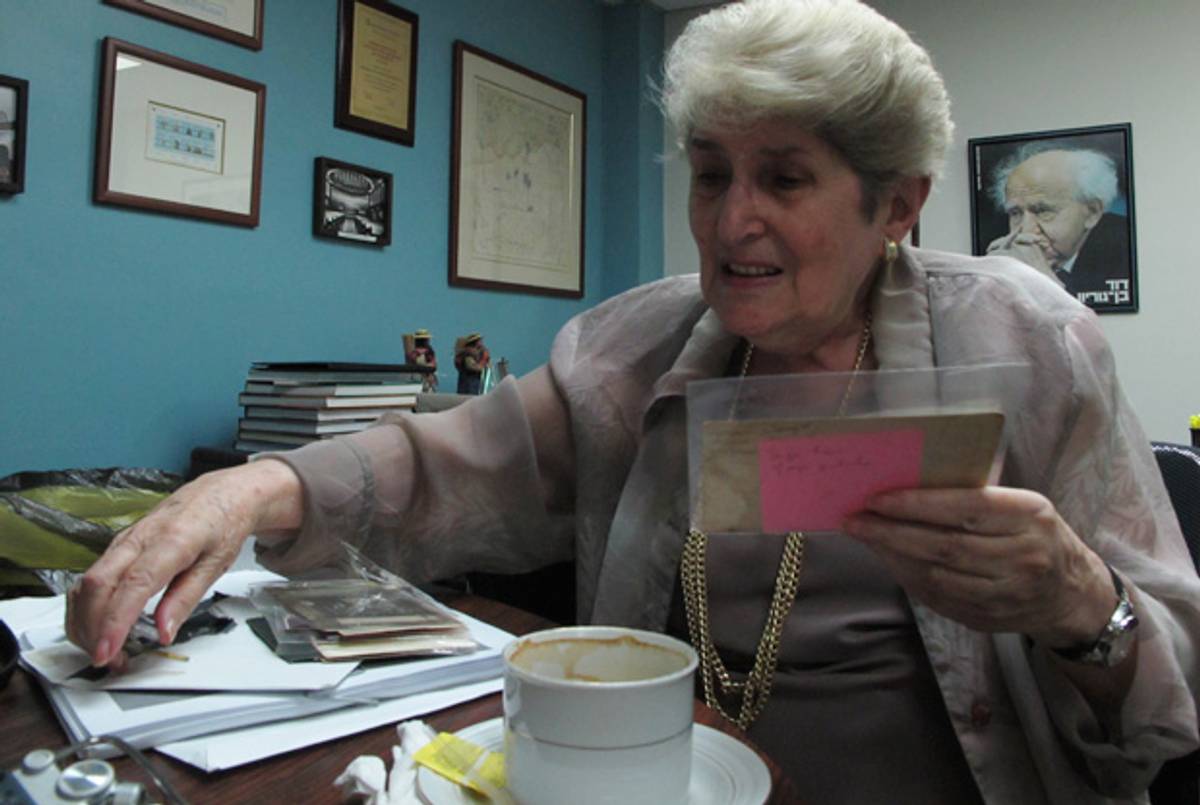
On one of my first days in Caracas, I visited the club with a friend of a friend, whom I will call Isaac. (“You just don’t know how these things can play when they come back around,” he said, explaining why he felt uncomfortable with me using his full name.) The first thing you see at the entrance to el club—after you pass through a turreted blast wall—is the well-groomed guards manning booths with bomb-sniffing Labradors. The deadly-serious, IDF-inflected manner with which they question a non-card-carrying member’s credentials makes it clear that this is a community living under threat.
But once inside the club—a sprawling compound, the last up the hill before the city gives way to the mountain—the feeling is of a prosperous settlement. A road leads past a banquet hall to a stacked parking garage with school buses, chauffeurs, and parents shuttling in and out collecting children from camp and after-school activities. A few lengths further, past the Colegio Moral y Luces Herzl Bialik school (founded 1946) and an administrative building, a stone-paved walkway introduces the main grounds, where an Olympic-sized pool shimmers in the warm tropical light. On an extended patio nearby, a half-dozen concession stands offer Kosher foods of all kinds, from burgers to arepas, sushi to hummus. The place is packed with families and a mood of easy familiarity: couches, knitted kippot, big bellies and suspenders, Teutonic, sun-spotted skin tones, sheitels and full-length skirts, strollers, grandparents, beer bottles, tropical fruit shakes, bearded Chabadniks, uniformed, dark-skinned cleaning and wait staff, and BlackBerrys holstered on belts.
On the day Isaac led me there, the Copa América, the continental soccer cup, was playing its final match, and all the chairs in the main, airy, covered patio were filled with males taking in the frenetic play-by-play of Paraguay versus Uruguay. A full-size fútbol field and baseball diamond laid a green carpet before the view over the bar-graph skyline of eastern Caracas. There were professionally printed banners reminding members of some of the club’s stated values: solidarity, “sense of community,” and respect—“all Jews are united and identified thanks to the state of Israel and the use of the Hebrew language.”
To our right, a few unsupervised kids were shooting baskets in an airy gymnasium that during the school year would seat thousands; the endlines on the wooden floor read HEBRAICA in light blue. An empty disco set-up, with a bar and a dancing balcony and lights, was being used to store a school display about the Holocaust Museum in Washington. A glass-walled health club, Gimnasio Galsky, harbored dozens of treadmills, weight machines, yoga mats, mirrored dance rooms, racquetball courts, and stacks of exercise balls. Cheerful instructors greeted us. Isaac couldn’t go more than a few paces without having to stop and say hello—to the pink-polo-shirted Ziggy, for example, blitzed from beer and soccer, looking for all his worth like a retired sales manager in Riverside, Calif.—and then follow each greeting with an explanation to me of his relation: “we went to school together,” “we grew up together,” “his father and my father play cards every day,” “we did business together,” “I almost married her.” More than anything contemporary, the scene was like that of an American Jewish community center in late 1950s New Jersey, or at least a Rothian, harmonious, fictitious rendering of that period’s peak—hardly opulent, but familiar and easy.
Against the feeling of external threat, the Jewish community of Caracas has constructed an archipelago of these heavily protected spaces where life as they know it can go on. Fifteen minutes west of the club by car is the original and main island: the grounds of the Confederación de Asociaciones Israelitas de Venezuela, known as CAIV, the umbrella organization of the many institutions of contemporary Jewish life in Venezuela. Unlike el club, which is the hub of the residential area where most Jews now live, the CAIV houses mostly administrative groups in a neighborhood that an earlier generation left behind. Fueled by Chávez’s impetuousness, the CAIV’s compound of social halls, a synagogue, and offices in leafy San Bernardino has taken on the air of a besieged bunker, the last fort being held before sounding the general retreat. Twenty-foot metal-spiked walls surround the grounds, and armed guards buzz visitors through bullet-proof glass and a metal detector. Inside, the president and officers seem to cling ever more tenuously to the idea that the community can outflank the profound social and political changes being wrought by Venezuela’s dictatorial president; that they can hunker down and eventually rebuild, or somehow stanch the flow of younger Venezuelan Jews leaving to find more promising economic and social conditions.
I went to the CAIV one day to meet Trudy Spira, a vigorous 79-year-old Holocaust survivor. Spira was there to attend an 80th birthday party for Pynchas Brenner, a long-serving Polish-born, Lima-raised rabbi. We sat in the CAIV president’s windowless office, and on the wall behind her were twin portraits of the liberators Simón Bolívar and David Ben-Gurion. Spira had spent some time on her looks that morning, with her gray hair in a salon coif accented by simple pearl jewelry. Later that day, she said, her twin grandchildren would be graduating from the Jewish community’s private high school, housed in the Hebraica club, to go to university in Caracas and confront a future in which—according to their grandmother’s mitteleurop-edged but still sing-song English, one of a half-dozen languages she spoke—they would have to “play it by the ear.”
Spira’s Venezuelan story began in 1955, when she was 22. Born in southern Poland, she was liberated from Auschwitz at age 12 and then settled in Israel with her mother. In London, where she’d been sent to boarding school after the war, the ceramic bathroom fixtures were manufactured by a brand called “Panama”—but beyond this she had never given South America a thought. With a tattered childhood, she had no sense of geography and little reason to imagine that elsewhere, away from the fires of Europe or the hardships of early Zionism, there should be a better place. Venezuela, the tropics, Simón Bolívar, the bustle of the hot port meant nothing to her.
Around the same time, a pair of Slovakian Jews, cousins, one married, both Holocaust survivors, had secured papers for Brazil but were ultimately buffeted across the Caribbean to Caracas, where they worked, first as door-to-door garment salesmen, then clothing merchants, then textile manufacturers, cobbling together new lives from scratch. In the ’5os, the unmarried of the cousins traveled to Israel to visit his sister, who in turn introduced him to a young lady who was living with her mother in an old Arab house. The young woman was Trudy Spira.
To Spira, the man was by all appearances well-to-do, a fellow Holocaust survivor with an established life in a faraway place where he described opportunities as limitless, so when he asked for her hand she accepted, on the condition that they eventually move back to the Holy Land to be with Spira’s mother. The marriage—hardly a matter of love but to Spira one of seemingly good fortune—took place in Israel. Spira packed a small suitcase with some dresses and a few photographs. Together the couple set out for South America, stopping in Paris for travel documents and a brief honeymoon.
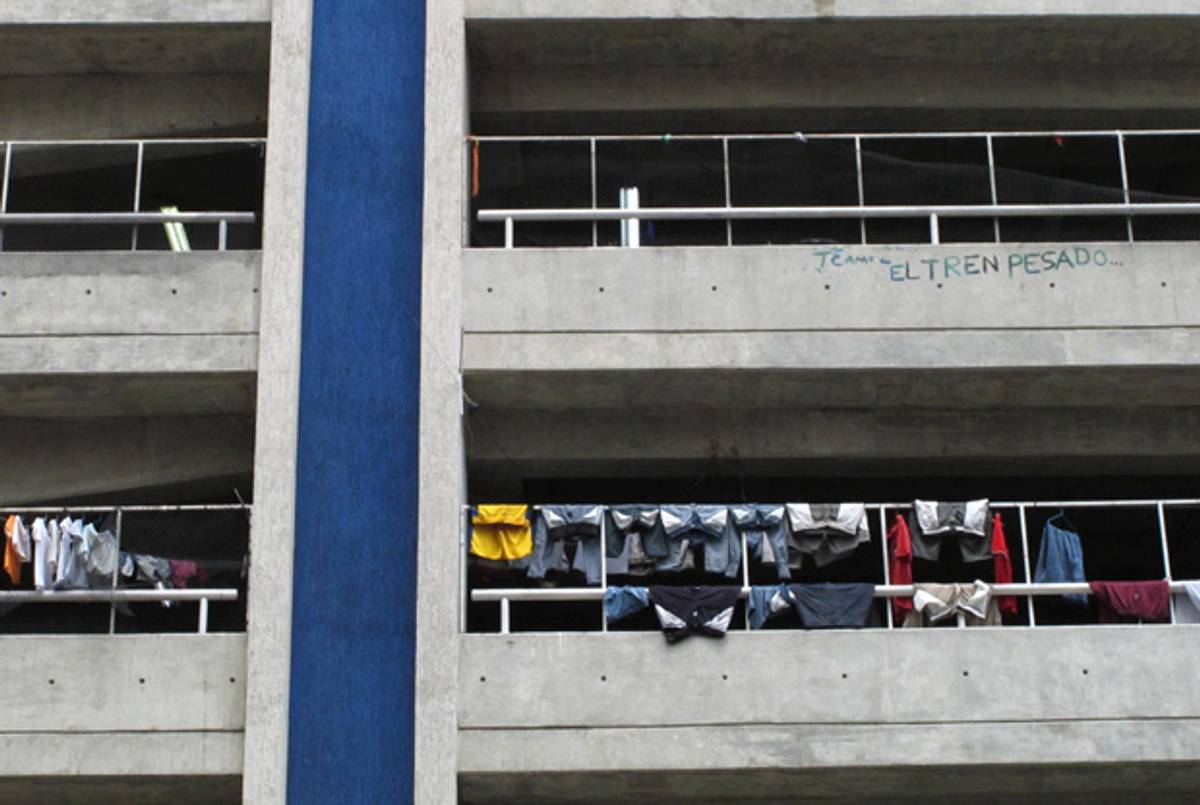
Once their steamer landed at Venezuela’s Guaira port, Spira’s new husband led her around the littoral Ávila mountain to the central, residential neighborhood of La Candelaria in Caracas. The weather was warm, and rain came in pleasant, nourishing showers. The mountain formed a blazing-green curtain behind the peaceful capital. The house had a live-in maid. And there was a small, growing community of Yiddish-, German-, Romanian-, and Hungarian-speaking Jews, who, like Spira, though deshechos, or spent, were eager to leave behind the horrors of Europe and were busy establishing themselves. Spira quickly realized the emptiness of the idea of going back to Israel.
Venezuela rewarded her husband’s hard work. He prospered, and their partnership solidified into a happy marriage. She became the matriarch of a burgeoning family. But when I asked Spira if she felt Venezuelan, she let out a long sigh. “I’m Jewish. I’m a Jew,” she said, acknowledging that she knew it was a wrong answer of sorts. She spoke of the children she’d borne in Venezuela, and of her gratitude toward the country, and then tried again: “Of course I feel Venezuelan,” she said. “But I’m a Jew first. When I pray, I pray toward Jerusalem.” In the last couple of years, though, despite her deep desire to never set foot in Eastern Europe again or “know anything about them,” Spira obtained a Slovakian passport, so that her children and grandchildren could also have a European Union passport—for, she said, “a last resort.” But Spira refused to imagine the worst. “I want to hope,” she said about Venezuela under Chávez. “I went through worse times than this. I saw more dangerous situations than this.”
***
By 2008, a year after Chávez nationalized major oil operations and on the heels of his successful seizures of cement, steel, and banking industries, Chávez’s political plan seemed to be gathering steam. After nine years in office, the president had deftly handled a potentially hostile military by allowing corruption to flourish and then threatening to crack down on it and by setting factions against each other. Massive street demonstrations had failed to topple him. And with the price of oil skyrocketing from under $10 a barrel when he was first elected to well over $100 midway through his tenure, Chávez sat on untold cash reserves for funneling to whatever politically expedient boondoggle should require it. He hadn’t hesitated to shore up his support with the underclass by promising, and sometimes delivering, housing, social programs, and a host of other populist endeavors. The signposts of these social improvement schemes are easily recognizable, if not always completed, all over Caracas: half-built architecturally ambitious cultural centers, officially squatted apartment blocks, patriotic paint jobs in the boxy stacked slums known as ranchos. Having thoroughly polarized the country along class lines, and with his opposition continually in disarray and disunion—or, as is currently the case, under direct legal attack—Chávez in 2010 slashed national medical and academic wages, increased business regulation, and set in motion a wave of expropriations now numbering in the hundreds of private enterprises, from banks to cattle ranches to shopping centers.
Under acute social and economic pressure, by 2007, Caracas had grown statistically even more dangerous than Baghdad. Indoor shopping malls became disproportionately important to Venezuelans, as havens where long afternoons and evenings could be spent without fear of mugging, car theft, or a stray bullet. Some of the most popular of these shopping centers were owned by a prominent Jewish industrialist, Salomón Cohen Levy. Cohen’s entertainment centers were called Sambils, and they were so successful in this new, more dangerous Venezuela that he had opened branches across the country and broken ground on a center in Santo Domingo, Dominican Republic.
In December 2008, the biggest and newest of the Sambils was set to be a hulking brick-and-cement structure occupying a full city block in La Candelaria, the central, once-partly-Jewish neighborhood where Trudy Spira had first landed. Sambil La Candelaria, a privately funded project that began with the support of the municipal authorities, was supposed to transform this dilapidated district with an injection of commerce and city life. But on Dec. 21 of that year, Chávez went on state television for his 323rd edition of Aló Presidente, his variety-slash-work talk show, and said, “How is it that they are going to build in the heart of La Candelaria a—what do they call it?—a Sambil? No, no, and no.” He directed his next line to the district’s mayor, present and wearing a red baseball cap, like the rest of the audience: “It’s in your hands, Mr. Mayor, but it can’t be allowed.” And then, as if as an afterthought, sounding very much like a whim, Chavez said, “We’re going to expropriate that and turn it into a hospital, a university. No, no, and no. … The construction of socialism cannot deliver vital areas of the people to shopping and excessive consumerism.”
Two years later, on Nov. 2, 2010, agents encircled the structure and declared it nationalized. Fences were erected, and within months, over 3,000 “damnificados,” or people left homeless by acts of God, had been moved in to ramshackle dwellings in the parking garage.
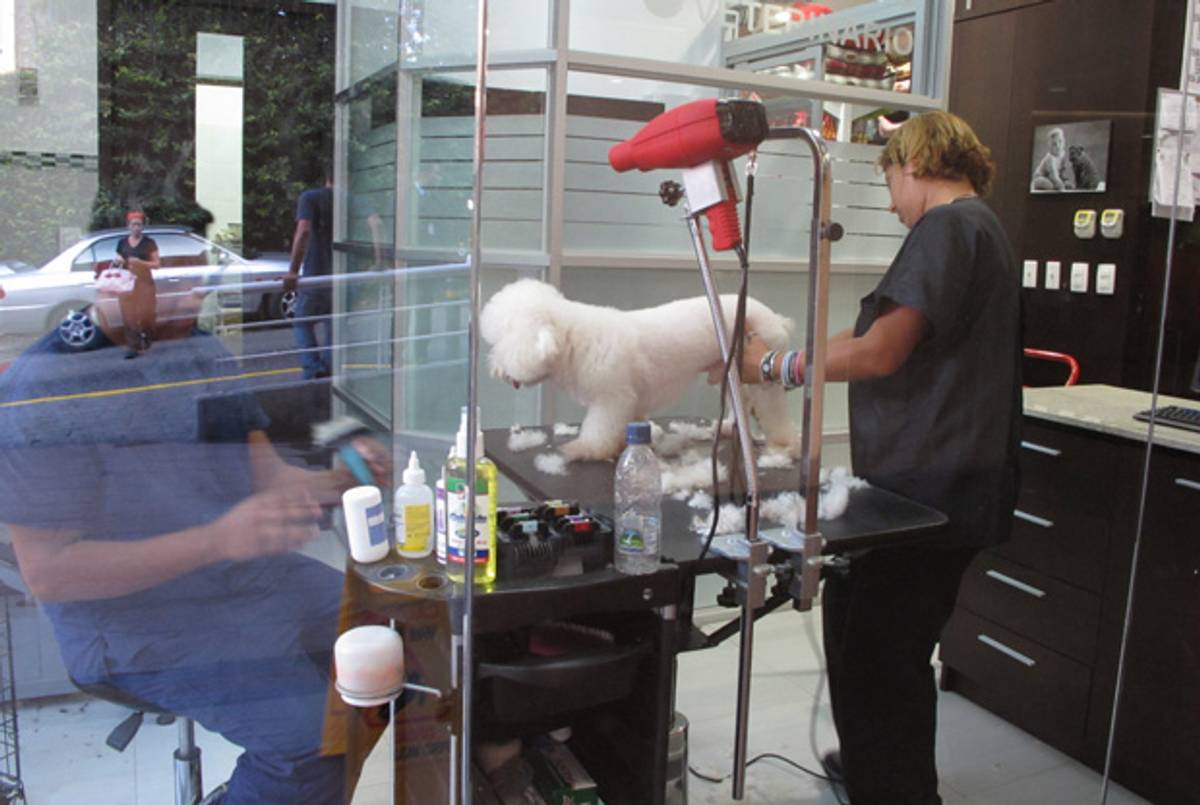
For a fragile diaspora, expropriation is the gravest of threats. But in the Jewish community of Caracas, as for a large part of the Venezuelan upper class, this menace has been complicated by the fact that so many are cosmopolitan and hold multiple passports, spending part of their years in New York, Miami, Madrid, Paris, San José, or Tel Aviv. Hence older Jews I spoke with in Caracas were sanguine about a potential loss of property, and when I compared their situation to that of the Cuban exiles in south Florida, many quickly agreed that they had already imagined themselves hunkered in a Venezuelan Miami, bequeathing Caracas deeds that their grandchildren would reclaim in 2041, once the Golden Age of the Bolivarian Revolution had concluded. As Alan Vainrub’s grandmother put it when I visited her apartment in Caracas, “The Jew will go and set himself anywhere”—her maid was serving us delicate Bavarian cups of aromatic coffee—“and build another story of 50 years, wherever it may be.”
Still, the damage to the place the Jews were leaving was significant, both for the Jews’ general economic consequence and for the hole the emigrants left in a tiny, tight-knit world. Though the community doesn’t take a census, the indicators—school enrollment, club dues, synagogue rosters, weddings, bar mitzvahs—all look bad. Rabbi Pynchas Brenner, the 80-year-old who had officiated in Caracas for 44 years, and who offered travel and life benedictions to this year’s graduating class, said that enrollment in the Jewish school had gone from 2,300 at its peak in the early 2000s to 1,050 last year. At the synagogue in the central neighborhood called Mariperez, once a mainstay of mid-century Jewish life, it is now a challenge to gather a minyan.
***
When I first met up with Isaac, at the Internet café he owns and runs in a commercial district of Caracas, he was pulling down the steel-plated armor protecting his storefront, using the same bunker mentality that was evident across the city, where murder rates had risen to an astonishingly high 200 per 100,000 residents, 10 times that of Bogotá, 15 times that of São Paolo, Brazil. Stuck to the glass underneath the plating was a sign that read “EN MORA”—overdue—in big red block letters, a device city officials had taken to using to shame owners into filing new commercial taxes. “Sure, I’m late,” Isaac muttered about what he owed, “but they make you jump through a thousand hoops and, what the hell, I’m not a delinquent.”
Isaac had told me to find his café by looking for the giant yellow fish, a new piece of public art, one of many dotting the recently bricked-over promenade. The municipality had passed an ordinance requiring all signage to be standardized, “so that no shop has an advantage over another,” Isaac said, his eyebrows shuttling up and down in mischievous complicity. What was once a riot of awnings like those of any market district in Latin America—some in the art-deco style in keeping with the more distinguished geometric buildings—is now just blank walls with wiring conduits dangling like ripped tendons awaiting government-approved signage. Regulated advertising (the French-built Metro system displayed only propaganda with Chávez’s Hecho en Socialismo logo) is just one of a long list of petty insults Isaac endures from the Chávez government every day, he said. Then he leapt out of his chair and raced to the back closet to find his yellow, blue, and red Venezuelan flag, with its horse facing to the left, which he marched outside and tucked in its standard. When he returned, his face was a combination of terror and relief. “I forgot that today is Simón Bolívar’s birthday,” he said. “I would have been fined.”
Isaac’s parents were born in Romania, and he was born in Venezuela. Under a mop of curly gray-flecked hair, he has the easy shuffling gait of a tropical creature, padding around sockless in brown Crocs and cargo shorts, thumbing through the photocopied catalogs left by the vendors who come by his store to take orders for headphones and printer-ink cartridges, popping open mamones, or honeyberries, and staining his knit polo shirt with their juice. “If I was making a lot of money, I would never leave,” he said. “But how can you operate like this?” His store has about 60 clunky black desktops with battered keyboards. He pays his counter staff the monthly minimum wage of 1,500 Bolivares Fuertes, or about $350, which he noted is half the yearly dues he pays to the Hebraica club, not including what he pays for tuition and to CAIV for the certificate that allows him to enroll his kids in the Jewish school. His greatest business expense, to power and cool the network, is for electricity, a utility so scarce in Caracas that my hotel prohibited air-conditioning and offered no replacement fans. By decree, Isaac explained, any establishment consuming more power than it had the same month two years earlier would be sanctioned with rations and charged at higher rates, for not doing its part to help reduce demand. “Everyone you talk to,” Isaac said, “they have a plan B.” He held a Romanian passport because, like other Venezuelan Jews, he traveled often and worried that he might get caught with no way of coming home.
Growing up, Isaac had been sent abroad repeatedly. When his parents were divorcing when he was 10, he was shipped off to a yeshiva in New York for a couple of years, an experience he described as traumatic. And after an uncle with an engineering degree arranged for him to study at the University of Oklahoma in Tulsa (again, oil at the root of all things Venezuela), Isaac spent four distracted and confusing years on the American plain, majoring in textiles. But his experiences abroad had confirmed for Isaac his Venezuelan Jewish identity: He found his Judaism to be portable and cosmopolitan and his nationality to be a mixture of exotic and cool. What mattered was that he would always come back to Venezuela, which is how a place becomes home.
Another way Isaac resembled many of the second- and third-generation Venezuelan Jews was in his observance. When asked, he told me flatly that he was “not religious,” but then he followed that with the fact that he wrapped tefillin every morning. (“A rabbi once told me that the way to be plugged in to God is like the same as using the telephone,” he said. “ ‘Tefillin,’ ‘Telephone.’ And if that idea sticks with me like that, it’s better not to risk it by not doing it.”) Then he added that he didn’t eat pork (“filthy animal”) but that he did eat shellfish (“this is the Caribbean, please”), and that he observed Shabbat every Friday night with his family. “But I’m not religious,” he said again.
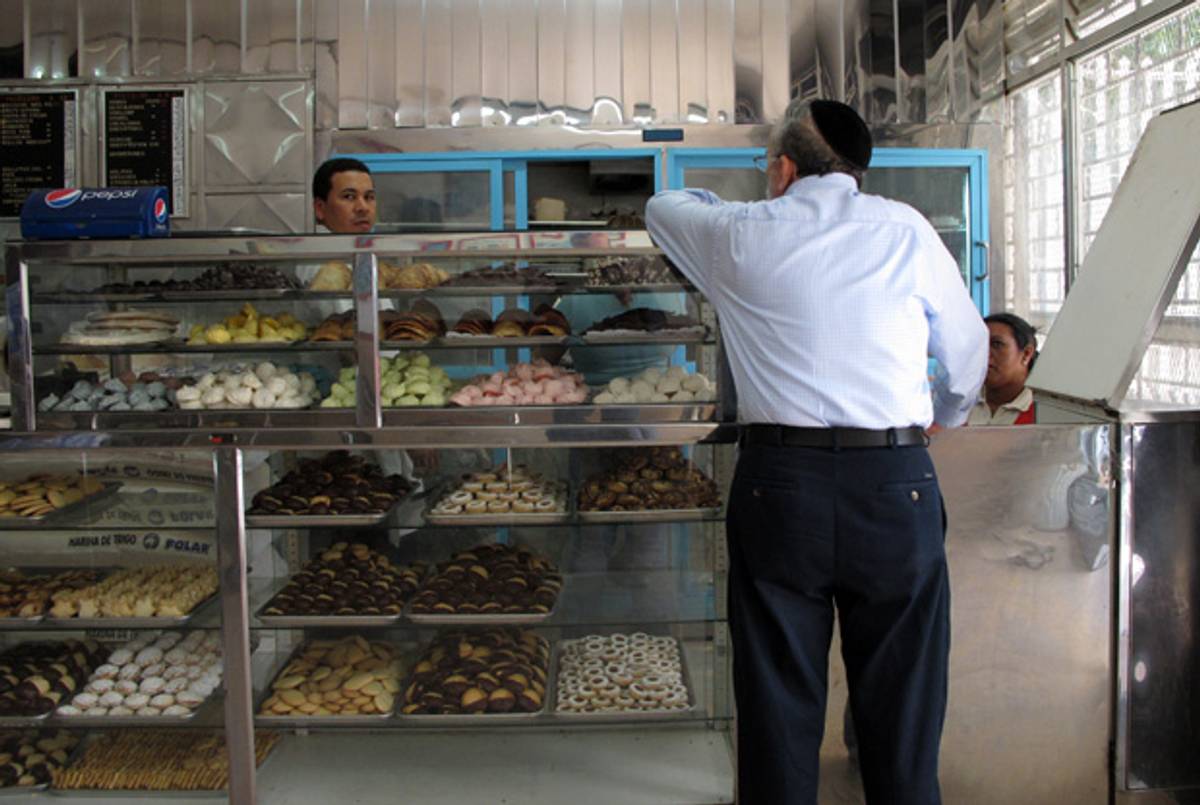
One afternoon, Isaac drove me through the formerly Jewish neighborhoods of San Agustín and San Bernardino, verdant jumbles of single-family houses entombed in high walls topped with electrified fences or spiky grates. Like other Latin American cities, Caracas is an anarchic, unzoned mix of high-rise, midsize, and half-finished apartment blocks wedged among colonial and mid-century houses. Condominiums with names like “Shagall” (a phonetic spelling) and “King David” mark the residences of devout Jewish families, who prefer to walk to shul or who hadn’t done well enough to make the move east to the more prosperous neighborhoods of Los Palos Grandes, Altamira, and La Florida, closer to the Hebraica club. Isaac pointed out that San Agustín had so emptied of Jews that the site of Caracas’ first Hebrew school was now under construction to be adapted into a Catholic primary school, its windows taped with Xs and its front yard a gravelly pit.
This movement across Caracas neighborhoods, Isaac explained, was no different than the natural movement of cities everywhere, like how the immigrants of the Lower East Side of Manhattan, or their children, found their way to the Upper West Side. The most recent Venezuelan migration happened to have occurred just before Chávez took power, with the founding of a number of synagogues in La Florida and Los Palos Grandes, largely in order for Jewish club and religious life to be consolidated. The white quinta where Isaac’s grandmother had lived was a half block from the CAIV; Crema Paraiso, where she would take him for dairy treats, was just down the hill. Isaac showed me all these things and then pointed to the spot where his car was when it disappeared. “Came out of synagogue,” he said, “and it was gone.” I said that a crime like that seemed out of place in such a quiet neighborhood. He chuckled to himself, and added, “Oh, it had a LoJack device. The police found it. And then I moved east.”
In that way, Isaac’s attitude toward the plight of Venezuela’s Jews is one of general resignation, expressed in a shrug that was familiar to me because it was the same one my Russian-born, several-times-bankrupt grandfather would use when he parked his white Buick badly in the lot of a Clearwater, Fla., strip mall: What are you gonna do? Jews don’t vote for Chávez, Isaac explained. But that was never where his support was from. Isaac could send his kids abroad, but then what? Who would make a living, and how? And where? In Miami’s Aventura neighborhood, like a Latino shtetl? In Israel? He’d been there plenty of times, but making full aliyah? For now, he seemed to be saying, there was nothing to do but stay put, get caught up on back taxes, and spend as much time as he can at Puerto Azul, the largely Jewish beach club an hour’s drive away on the other side of the Ávila, where family has been going for 40 years, and then come back to his Internet café and the power outages and MORA sign and the little humiliations of life under Chávez. “I have a Cuban friend in Miami,” Isaac said about the once-thriving Jewish community that has all but disappeared from Havana. “And he’s said to me, ‘My friend, the same thing is happening here.’ ”
***
Directly above Isaac’s Internet café is a large cement high-rise building built by a man named Hillo Ostfeld. One sunbaked afternoon, I was picked up by a bulletproof green Chevy Blazer, driven by Ostfeld’s Colombian-immigrant driver. As we crawled through traffic, A/C on high, the driver told me about the amateur baseball he played, and then about leaving his civil-war-ravaged rural home to find opportunity in Caracas, and how working for “el señor Ostfeld” had always been a benediction. He was neatly dressed in pleated slacks with a number of phones and pagers affixed to his belt, and he officiously led me past security and up the elevator to the penthouse offices where Ostfeld, his lawyer son-in-law, and a number of associates manage the various enterprises el señor built over his 57 years in Venezuela.
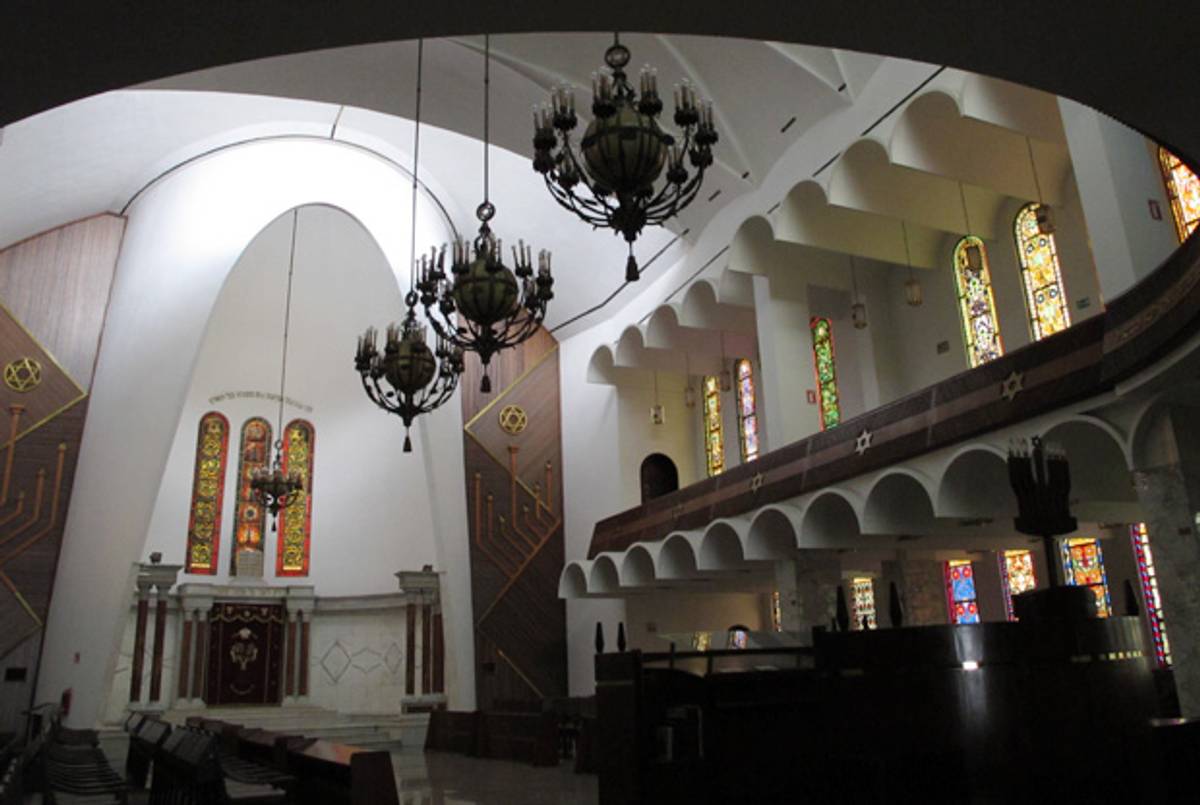
Ostfeld’s business card identifies him as the president of “Corporación H-F-18, C.A.” and I had been introduced to him at Brenner’s 80th birthday party as a former, four-term president of the CAIV and a Holocaust survivor. He sat behind a mattress-sized, leather-topped, tropical hardwood desk set in a cavernous room with a spacious sitting area and a gold-plated standing ring sculpture. An imposing man with deep-set blue eyes in the middle of a round, stout, bald head, he had a practiced, deliberate manner that was betrayed only by some pilling and fraying around his shirt collar: a man who had survived it all and lived to tell the tale, who needed a new shirt and nothing else. A triangular wall of glass framed the full breadth of the green slopes of the Ávila. From the window I could just make out the graffiti I’d noticed on the way in to the subterranean parking lot: “FUERA”—out with—“EL CASTRO-COMUNISMO DE VENEZUELA.”
Like Trudy Spira, a close friend of his, Ostfeld had lived several lives, starting with a Romanian boyhood, then the war, Israel, and eventually South America. He had published his memoir in Spanish in 2009 and titled it “Sin Tregua,” which translates best to “without mercy” but could also be “relentless” or “implacable,” all of which defined Ostfeld’s self-regard—and helped explain the size of his office. The book was written with his daughter, a Jungian analyst with a degree from the University of Essex. As the book recounts—“After rolling for many a time over the intricate sinuosities of the fertile mountains”—Caracas turned out to be the last port for Ostfeld and his wife, Klara, save for repeated trips to Israel, Romania, and a holiday home in Stowe, Vt. (“I like the cold,” Ostfeld said. “I am from Romania.”) And the Ostfelds, like so many of the Venezuelan immigrants I met during my stay, had three to five generations of family fanning out after them, many of them now gone to Miami, Madrid, and elsewhere. As we talked, Ostfeld periodically yelled out to his secretary, who was seated at a tiny desk in the hallway, for the apparent purpose of completing Google searches—including one for video of Ostfeld’s television appearance in the immediate aftermath of one of the community’s worst scares.
On the night of Jan. 31, 2009, a Friday, a dozen unidentified men broke into the Gran Sinagoga Tiféret Israel, the oldest standing synagogue in Caracas, in the tiny central neighborhood of Mariperez, not far from the city’s largest mosque and a major cathedral. The assailants bound and gagged security guards, entered the sanctuary, ripped open the ark, and splayed its silver-tinged contents out across the floor like leftovers from a bad night drinking. Then they rifled through administrative files, apparently stealing nothing, and spray-painted “DEATH NOW,” “OUT, OUT,” “ISRAEL MALDITOS,” and a horned devil with 666 in red on the walls. Before dawn, word had spread through the community that a terrible profanation had taken place, and by first light a significant portion of the Venezuelan Jewish community was gathered in the courtyard, clamoring against the act. No one had been hurt.
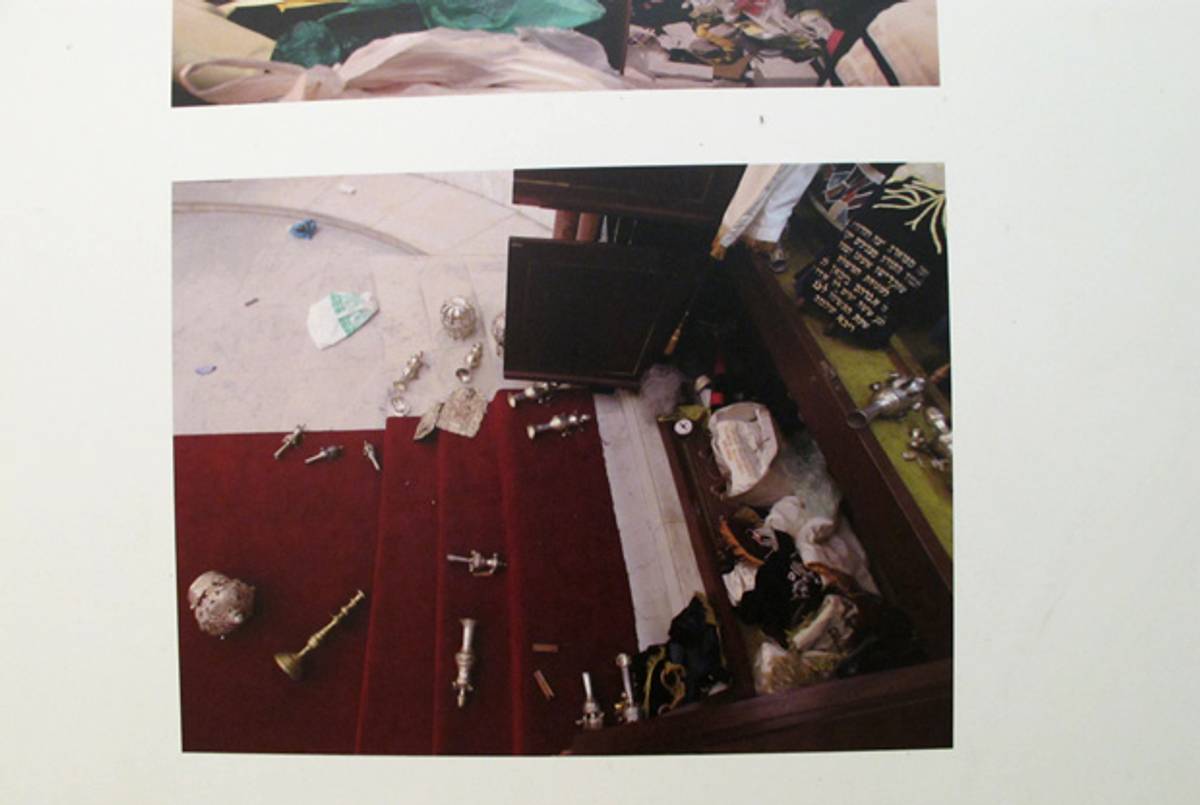
Following the attack, Ostfeld presided over a ceremony, attended by representatives of the American Jewish Congress, the Anti-Defamation League, and others, in which he spoke in English of his childhood nightmares about Germans, of wanting to jump from windows and race to the U.S. Marines. “But lately,” he told the crowd, “I wake up in the middle of the night and see in Caracas graffiti about the Jewish. ‘Death to the Jewish.’ Something has happened in the last couple of years. I’m not going to talk against the government, nor in favor of the government, but something has changed. As we say at Pesach, ma nishta na? Something has changed here.” His wife, Klara, also a Holocaust survivor, then came to the podium and read something she’d written titled “Job,” which began, “Jewish presence in Venezuela has been felt since the dawn of Independence, through the support given to the Venezuelan people in their fight to obtain self-determination.” She ended with a poem of her own, titled “Emigrant,” which she read while Ostfeld stood by her side:
It hurts in
the body
the adoptive fatherland
deprived
of the feeling
of belonging
my soul cries
dumbstruck
dry tears
suck the sap
the sap of my life.
Talk of the attack still leaves people visibly shaken. “It was a terrible shock when I saw what was written on the walls,” Trudy Spira told me. “I’m sure the ones who wrote it didn’t even know what they were writing. Because when they write ‘Free Palestine’ or ‘Jews go to hell’—they don’t know what it means. They have a leader, he tells them and they do it. It’s automatic. That’s how the Hitler Youth was.”
***
The profanation of the Mariperez synagogue occurred barely a month after Operation Cast Lead, Israel’s winter incursion into Gaza, which Chávez would soon snatch up as a cudgel in his effort to terrorize the Jews of Venezuela as part of his campaign against the disfavored rich. On Nov. 3, 2009, Chávez expelled the Israeli ambassador and six other diplomats, and in June 2010, he said during a visit by Syrian President Bashar al-Assad: “Israel has become the assassin arm of the United States. The Israelis are not acting alone. They are an executing arm of a genocidal policy.” Raids on Jewish establishments coincided with the demands of Iranian diplomacy or the local campaign calendar. Earlier that month, after the Israeli raid on the Gaza-bound flotilla that included the Mavi Marmara, Chávez, seated in front of a backdrop of stacks of cooking oil, margarine, and other food staples, and wearing a bright red T-shirt under green army fatigues, began an extraordinary, passionate, televised tirade:
You saw the Yankee Empire. You saw the massacre that the genocidal state of Israel committed against a group of pacifists. … You saw it, yes? They massacred people. Look at what the United States said. They said they are “worried.” They are worried. Imagine it. God help us if this had happened in Venezuelan waters. We would have been invaded. Rest assured that they would already have invaded us. But no, because it’s Israel, they are allowed to do anything. That’s an example of a double standard. The government of Obama condemns terrorism—as long as it isn’t committed by themselves. By them, the United States, or their ally, Israel. They accuse us, they accuse me, of supporting terrorism. They are the ones who support terrorism. And I take this opportunity to condemn once again, from the depth of my soul and from my guts, the state of Israel. Damn the state of Israel! Maldito sea! Terrorists and assassins!
“Viva!” shouted the audience of red-shirted supporters, including the foreign minister Nicolás Maduro, all breaking into applause.
“And viva the Palestinian people!” Chávez replied, visibly pleased by the strength of his condemnation, before saying that Israel “finances the counter-revolution” and that Israel has dispatched Mossad agents to hunt and kill him. “Where is justice in this world, by God?” he asks. “Where is justice?”
A pall fell over the Jewish community. Two weeks after the speech, Paulina Gamus, the only Venezuelan Jew to serve in the National Assembly, wrote in a newspaper column that when Chávez damned the State of Israel, he had done something that none of the fiercest Islamist enemies of the Jews had done—not Nasser, not Assad, not Qaddafi, not Ahmadinejad. Damning Israel, she wrote, “means government, men, children, youths, women, old people, scientists, partisans, opposition, houses, hospitals, schools, universities—all damned.” It wouldn’t have been as bad, she said, if Chávez had merely damned the Israeli government. “I will risk 30 years of prison to hazard a guess about the kind of curse that might return upon the president for life of Iranzuela, but to others and since time immemorial, very ugly things have befallen others,” Gamus wrote. “By warning you we’re doing you a favor.”
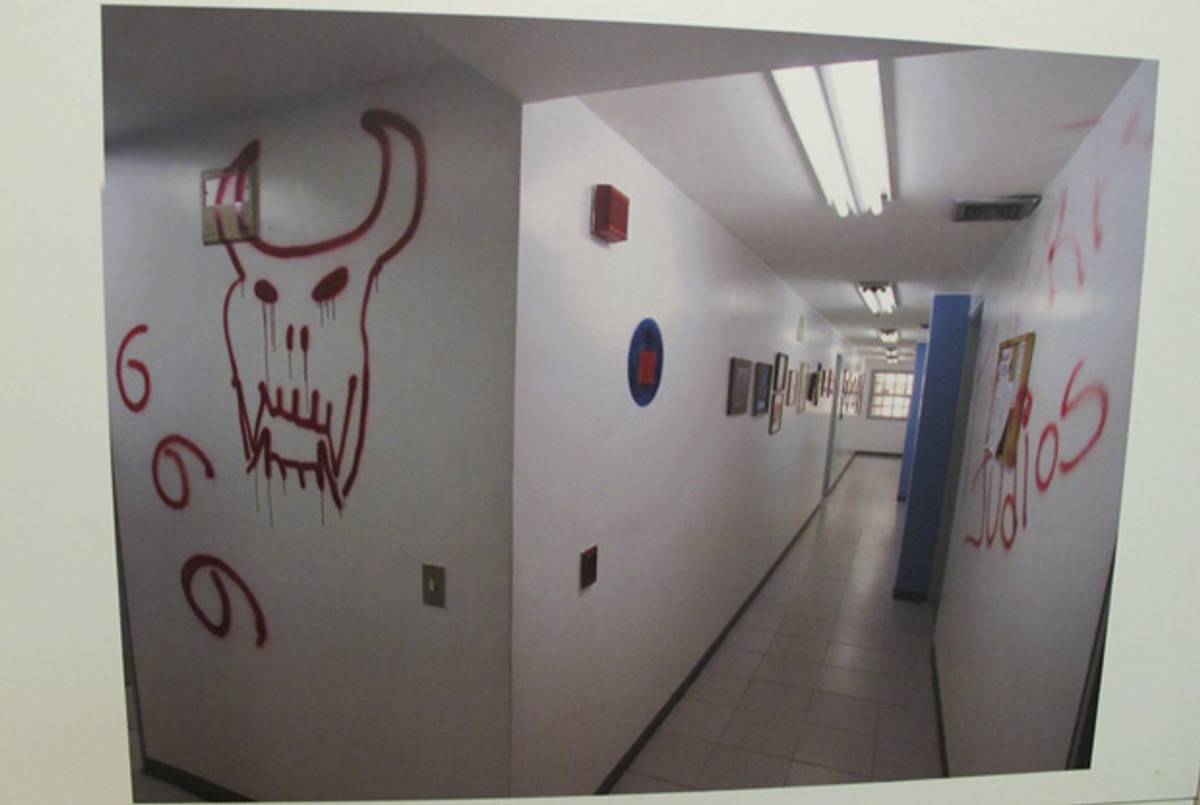
The superstition had some currency. Ostfeld and his CAIV comrades, who wanted a meeting at the presidential palace to discuss their changing situation, decided to exploit this. “[CAIV President] Salomón Cohen Botbol had someone close to the president bring a message to a friend of the president,” Ostfeld recounted to me. “The message was this: ‘Look, I am Cohen,’ and it explained ‘Cohen,’ the cohanim, priests, and that he who damns Israel gets the damnation returned on him. ‘And so I’m expecting something bad to happen to the president and Venezuela. And since I’m Venezuelan, I’m wondering what it is that can be awaiting me. Because it is shown that he who damns Israel gets the damnation back. It is written.’” According to Ostfeld, the friend told this all to the president, who not long after asked for a meeting with the community, with a specific request that they bring a rabbi—other than Brenner, who for his public political stances was persona non grata in the palace.
In a typically odd bit of Chávezian politics, the minister for foreign affairs, Maduro, had been assigned the Jewish portfolio after having expelled the Israeli ambassador over Operation Cast Lead. Botbol had complained about this arrangement, but Ostfeld decided that it would be best to work in the system, and he invited Maduro to travel with him to Miraflores. Chávez was a gracious host, according to Ostfeld. He offered gifts of honey to each visitor. He heard the three grievances the representatives of the CAIV wanted to bring to him, about anti-Semitism, personal security, and relations with Israel.
“We were there about an hour and a half,” Ostfeld recalled in his office, as he showed me photos from the day: Chávez posed with the elders of Caracas’ Jewish community and wearing his trademark flag-colored warm-up jacket, looking much shorter than Ostfeld and the other Ashkenazi immigrants. “After I presented our case, he thanked us and said, ‘Look, the only thing I ask is that when I broke relations with Israel, I said some damning things, and I regret that.’ He had said his damning words three times, and he knew he’d done something wrong. And so he came up to the rabbi and said, ‘Rabbi, please, give me your blessing.’ ” So then in the ornate 19th-century confines of a room in the seat of power in central Caracas, Rabbi Isaac Cohen, of the Sefardic Asociación Israelita, pronounced a general blessing in Hebrew. “Chávez couldn’t have understood anything,” Ostfeld said, but the leader seemed pleased. “The rabbi hadn’t blessed Chávez by name. He had blessed the Venezuelan people.”
A few months later, Ostfeld noted mischievously, Chávez announced that he had had a baseball-sized tumor removed in Cuba. Then the president declared that Venezuelan socialism’s motto was to be changed, after his surgery, from “Death or Victory” to “Viviremos y Venceremos”—“Life and Victory.”
***
At the CAIV’s “Information and Analysis Office,” three women spend their work days following the Twitter feeds of declared Venezuelan Hezbollah sympathizers and members of “Yihad Latinoamericano.” Their tasks include culling, highlighting, and translating anti-Semitic blurbs from the Venezuelan press to file weekly reports with the Anti-Defamation League, and thus help defend against further outbreaks of anti-Semitism. One Twitter user they were watching, Hindu Anderi, had called for an anti-Zionist demonstration at the Norwegian embassy in Caracas, following the massacre on Utoya. Anderi organized her activities on a blog with contact information, and so I arranged to meet her at the Lido shopping center below the embassy, to get a better sense of the nature of her complaints against the Jews and Israel. She had also been listed in the Anti-Defamation League’s thick portfolio cataloguing anti-Semitism under Chávez, in this case as a host on a show for state-run Radio Nacionál de Venezuela, in which she had described an “extermination and ethnic cleansing plan undertaken by Israel.”
The day before our meeting, I had wandered in the renovated, vibrant downtown, testing a claim Isaac had made, that the Protocols of the Elders of Zion, along with some other lurid Nazi tales such as Mein Kampf, were easily obtainable in cheap Spanish-language editions at the popular book stalls directly across from Miraflores, the presidential palace. Isaac was right. I bought Los Peligros Judío-Masónicos: Los Protocolos de los Sabios de Sion—after some playful bargaining, for less than a third of the asking price of 35 Bolivares. In May, on the Venezuelan National Radio program La Noticia Final, host Cristina González had praised quotes from the book, prompting press releases from the CAIV, the Simon Wiesenthal Center, and the ADL. Anderi had worked with González, who would not speak to me, so I brought the book to our meeting.
Anderi, whose face was heavily made up in gaudy greens and reds, was of Lebanese descent, born in Venezuela. Her protest against the Norwegian embassy was a bust: Not a soul bothered to show on that Saturday morning. So, we sat in the mall café and I asked her how she’d developed such a passion for politics that seemed ajeno, foreign or remote, to Venezuelan life. Norway? Israel? Palestine? Wasn’t there enough injustice, violence, and inequality here? “This is about humanity,” Anderi said to me. “Justice is justice. I can’t make choices about what to support. If I see assassins”—which is how she viewed Israelis, she said—“I can’t stand by and let them get away with it.” She then said, “You’re Jewish, aren’t you?” and without waiting for an answer, added, “I thought so.” And then she asked me what I was after, and our conversation broke down, and she was gone.
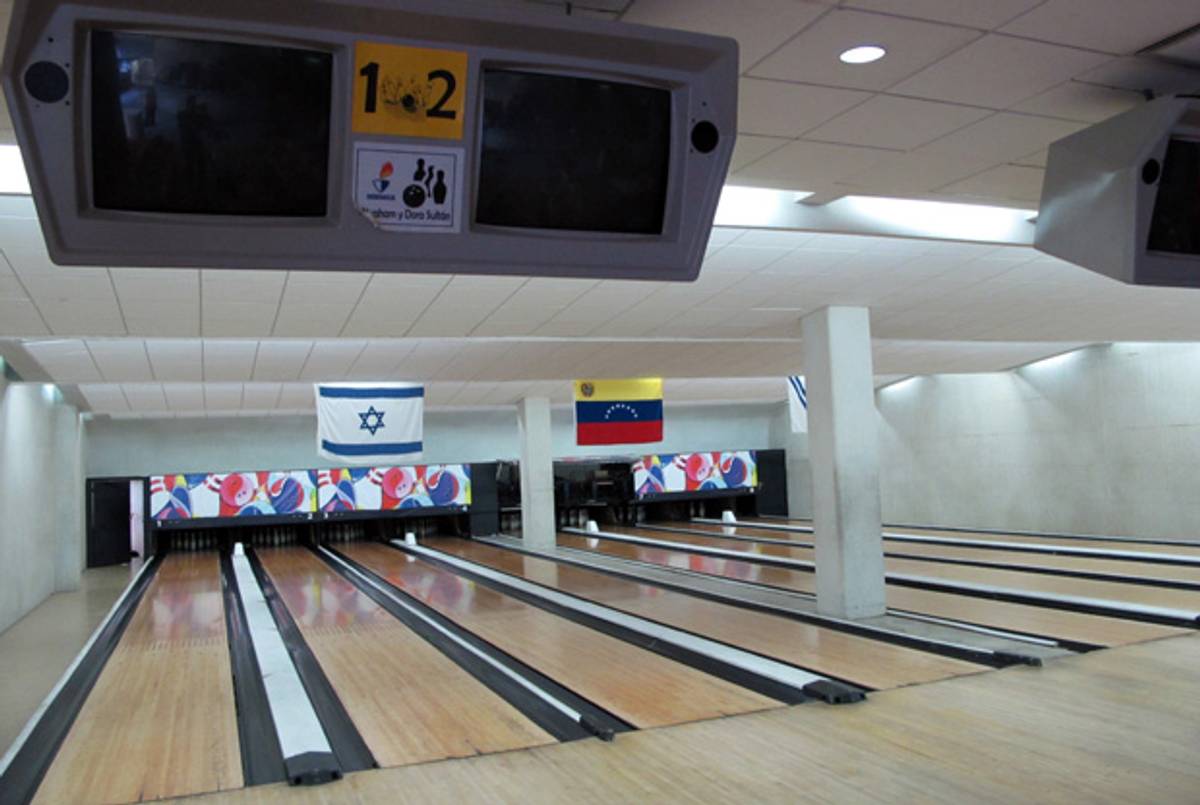
With no protest to watch I took the cable car up the Ávila, riding high into the misty cool cloud cover and up over the bustle and chaos of a Latin American capital, looking down on the place that so many Jews had called home. From above, it seemed a precious, fertile valley. It was easy to summon some of the awe and relief those immigrants must have felt landing here 100, 60, 30 years ago, but also easy to summon their anguish now. But surely they weren’t afraid of nutters like Hindu Anderi.
One early afternoon, I hopped the packed metro to La Candelaria and walked up a grid of narrow streets, past the series of tascas—smoky 1970s-style tapas joints opened by a wave of Spanish and Portuguese immigrants escaping Franco—that lent the neighborhood its old-world feel. The sidewalks were crowded with vendors hawking sewing kits, used clothes, and pirated CDs, and pushing shopping carts piled with sad-looking apricots, over-plump grapes, and pungent soursop for sale. This was the lower-class neighborhood with the expropriated Sambil, the one that was supposed to be for the poor, an experiment in urban renewal. It had been built nearly to completion, with almost all of the 273 stores leased, when it was shut down, fulfilling the prophecy Chávez had made on television a year and a half before. That’s how I found it: encircled by chain-link fences, ripped plastic tarps flapping, an empty shell, its garage officially squatted by thousands.
I checked in with the military police unit that was manning a gateway on the parking entrance ramp while some artists on scaffolding painted a riotous mural there. On that first floor, thin windowed walls had been used to make rooms for training programs, a childcare center, a medical post, and administrative offices, and the feel was of a bustling aircraft carrier on a relief mission, temporary and adrift. On the eight floors of parking deck above, there was row after row of shelters, clothes dangling outside, children running everywhere, idleness.
In Kasbah, a tapas bar a block from the shopping center, I chatted with the owner, born in the Canary Islands and, like many of the Candelaria residents, still hanging on to his Spanish guttural lisp. He deplored the state of his neighborhood and the missed opportunity for the first new development since he’d moved there in the mid 1970s. Did he know that Cohen was Jewish? “Claro,” he said, of course. Was the expropriation directed against him because of that? “Not at all,” he said. “Cohen’s just rich, and Chávez hates the rich.”
Representatives and acquaintances of Cohen, widely considered to be one of the richest Venezuelans, relayed to me that he was declining to comment, given his precarious political situation. CAIV president Salomón Botbol insisted that Cohen wasn’t going anywhere, and then expressed his admiration for how cavalierly the builder had absorbed the massive loss, which would have devastated a less deep-pocketed man. Other of his projects, including a number of high-rise apartment towers for lower-middle-class clients, directly across from the Mariperez synagogue, remained under construction. But Cohen had also notably started a number of new ventures across the Caribbean, hedging his bets.
“The decision to migrate is a neatly personal one,” Botbol had told me a few days before. Everyone here is caught between the opposing imperatives of families wishing to stay together and economic, social, and political pressure to move to avoid financial collapse. Then there is the Jewish duty to maintain traditions—the fear of assimilation. In Caracas, for 60 years, waves of Jewish immigrants built Jewish institutions of enormous influence. Today they are, like many Jewish institutions, tethered by geography and of limited reach. Botbol, Isaac, Spira, Rabbi Brenner, young people like Alan Vainrub all placed their faith in communication technologies—gossamer lifelines: video calls, voice-over-Internet protocols, email, chat. This was supposed to keep a community together? I told Botbol I couldn’t see it and pressed him about the mourning associated with inevitable loss. But he refused to think of what is happening here as the end of a community and a way of life. “This is grief for having lost an old and aging family member, who lived a full life—not for an entire family,” he said.
***
Alan Vainrub, now 29, married the Costa Rican girlfriend he met in Boston. “We decided to go back to Latin America,” he told me by phone from San José, a place he called “the closest we could get to our roots.” At a Jewish engagement ceremony in Caracas, before their wedding in Costa Rica, Rabbi Brenner offered a blessing to the young couple. He praised how far Alan had come: his Harvard MBA, his lovely Jewish bride, and the future that awaited them in Central America. And he talked about Vainrub’s father, one of the community’s leading physicians, who was still running the medical practice responsible for a large portion of those Jews who remained. The day Vainrub’s father left, Brenner said, would mean the end of the Venezuelan community, because who would care for the sick? And who else was left in Caracas save for the old and sick?
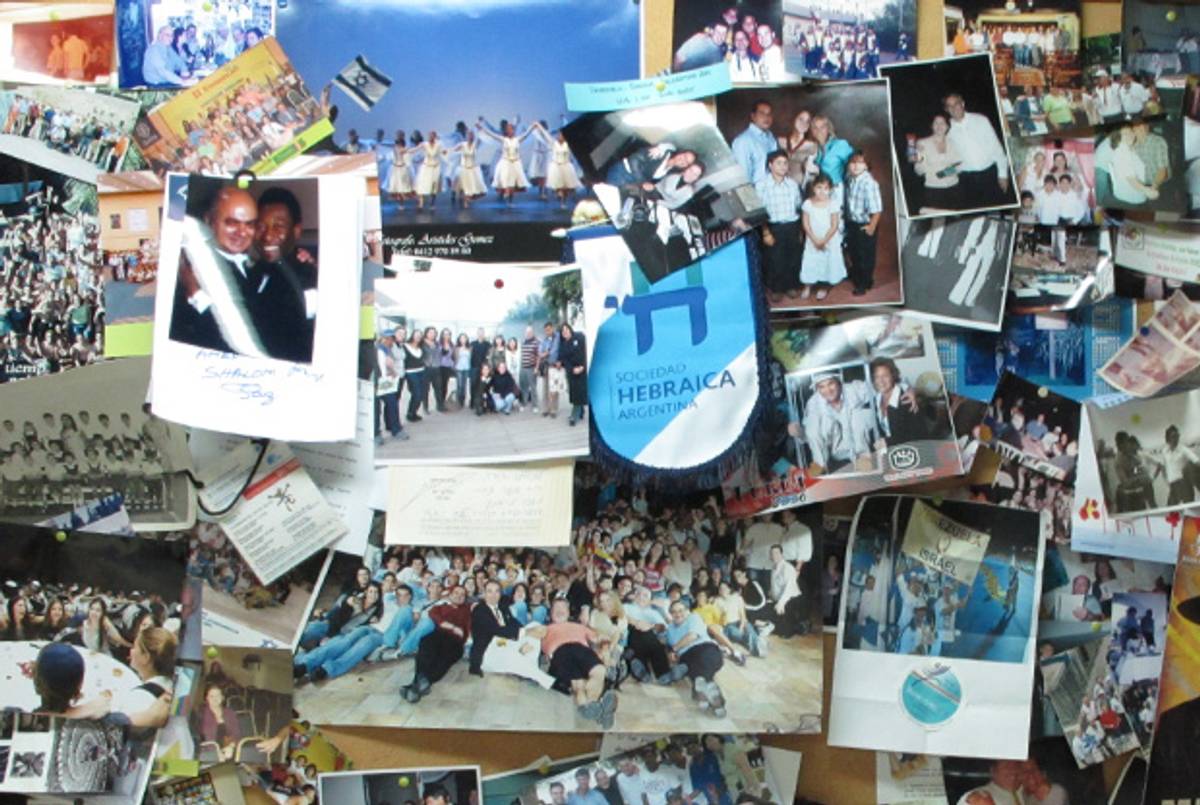
By then Vainrub knew, he told me, that returning to Venezuela was no longer an option. His sister had had a third child in Aventura, the neighborhood in Miami where many Venezuelan immigrants had landed. His new wife felt unsafe in Caracas. His grandfather had died, and his grandmother was stubbornly staying but opposed to everything Chávez represented and had done to her offspring. Now, a year after moving to San José and starting a new job, Vainrub is one of 2,500 Jews—some Latin American transplants, some Lubavitchers, some descendants of Ashkenazi and Sefardic refugees—who live in Costa Rica. He’s expecting a baby boy, and for the first time in years, his extended family will be together for the bris in San José. “I went from seeing everyone once or twice a week—all of my first cousins, uncles, and aunts, religiously, at least once a week—to not seeing them at all,” he said.
He appreciates how his parents nudged him north. “I thought that I was coming back,” he said. “By the time I left, I’m not sure if they thought so, too. A lot of people think about their plan B, and have a plan B for leaving in case of emergency. But most don’t have to use them.” He told me about his parents having four cars robbed, one of them twice: stolen and returned and stolen again.
“So, are your parents still in Caracas?” I asked him.
“No,” he said. “They left this year. My father opened a new medical practice—in Aventura.”
***
You can help support Tablet’s unique brand of Jewish journalism. Click here to donate today.
Matthew Fishbane is Creative Director at Tablet magazine.